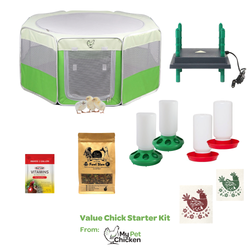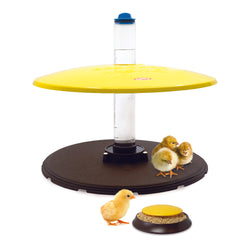All about Fowl Spirochetosis (Borrelia) disease
Back to blog
Spirochetosis is a tick-born bacterial disease that is rare in the United States (thankfully!). Spirochetosis can be caused by the Brachyspira or the Borrelia bacterium. Both are treatable using antibiotics--under a veterinarian's care. This article examines the type caused by Borrelia bacteria:
Fowl Spirochetosis (Borrelia) Also called
AIS, Avian Intestinal Spirochetosis, Avian Spirochetosis
Prevalence
Uncommon in North America, but more so in the south because the primary tick that spreads the disease prefers a warm climate. Climate change is likely to make this infection more common in the future.
Signs
General signs -
Sometimes no symptoms. Other times, symptoms may include lack of appetite, lethargy, sleepiness, increased demand for water, weight loss or failure to grow, drop in laying, dirty eggs, pasting
Cardinal or diagnostic signs -
Yellow or green watery droppings with a lot of white urates. Lab diagnosis.
Cause/s
Borrelia anserina, a spirochete (bacteria) related to the bacteria that spreads Lyme disease.
Communicability
Yes. It is a tick-borne illness, and can also be spread by mosquitoes. The main tick vector is the fowl tick, Argus persicus, although some other types of ticks like Argus sanchezi can spread the disease. Within the flock, the bacteria doesn't last long off the hosts, but can be picked up from scratching/foraging in fresh droppings (or knocking them into the feeder), from eating infected ticks or mosquitoes, or from squabbling/picking that draws blood.
Communicability to humans
No risk known.
Incubation period
3 to 12 days
Latent
No. Chickens that survive are not carriers, and are immune for some time to re-infection.
Endemic
Yes, however it's uncommon in North America.
Home treatment and/or prevention
Prevention: Reduce stress in the coop to reduce picking and squabbling. Provide plenty of space. Keep coop bedding dry and change it frequently. Keep feeders and waterers clean. Keeping grass mowed in the chicken run may help, but ticks can still be brought in by wild birds.
Treatment: No home treatment. Consult a vet.
Veterinary care
A vet can give you a firm diagnosis and treatment. Several antibiotics are quite effective against spirochetosis, but your vet will need to prescribe them and offer advice on the egg-discard period.
Recovery
Variable. Some strains are quite mild. Others are severe.
Other conditions, illnesses and/or diseases with similar signs:
Loose droppings are common with other infections like coccidiosis and digestive issues. Fowl Spirochetosis (Brachyspira) is quite similar, but doesn't require the tick vector. In most cases only lab diagnosis can tell them apart.
Fowl Spirochetosis (Borrelia) Also called
AIS, Avian Intestinal Spirochetosis, Avian Spirochetosis
Prevalence
Uncommon in North America, but more so in the south because the primary tick that spreads the disease prefers a warm climate. Climate change is likely to make this infection more common in the future.
Signs
General signs -
Sometimes no symptoms. Other times, symptoms may include lack of appetite, lethargy, sleepiness, increased demand for water, weight loss or failure to grow, drop in laying, dirty eggs, pasting
Cardinal or diagnostic signs -
Yellow or green watery droppings with a lot of white urates. Lab diagnosis.
Cause/s
Borrelia anserina, a spirochete (bacteria) related to the bacteria that spreads Lyme disease.
Communicability
Yes. It is a tick-borne illness, and can also be spread by mosquitoes. The main tick vector is the fowl tick, Argus persicus, although some other types of ticks like Argus sanchezi can spread the disease. Within the flock, the bacteria doesn't last long off the hosts, but can be picked up from scratching/foraging in fresh droppings (or knocking them into the feeder), from eating infected ticks or mosquitoes, or from squabbling/picking that draws blood.
Communicability to humans
No risk known.
Incubation period
3 to 12 days
Latent
No. Chickens that survive are not carriers, and are immune for some time to re-infection.
Endemic
Yes, however it's uncommon in North America.
Home treatment and/or prevention
Prevention: Reduce stress in the coop to reduce picking and squabbling. Provide plenty of space. Keep coop bedding dry and change it frequently. Keep feeders and waterers clean. Keeping grass mowed in the chicken run may help, but ticks can still be brought in by wild birds.
Treatment: No home treatment. Consult a vet.
Veterinary care
A vet can give you a firm diagnosis and treatment. Several antibiotics are quite effective against spirochetosis, but your vet will need to prescribe them and offer advice on the egg-discard period.
Recovery
Variable. Some strains are quite mild. Others are severe.
Other conditions, illnesses and/or diseases with similar signs:
Loose droppings are common with other infections like coccidiosis and digestive issues. Fowl Spirochetosis (Brachyspira) is quite similar, but doesn't require the tick vector. In most cases only lab diagnosis can tell them apart.



